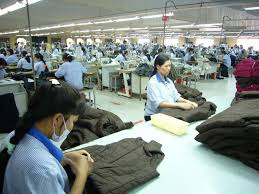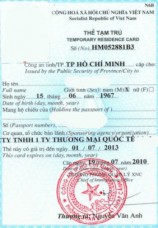Physical acceptance of sub-standard goods for shipment waives buyer’s right to claim under contract
Court case commentary on physical acceptance of sub-standard goods for shipment waives buyer’s right to claim under contract
Post date: 20-08-2014
4,457 view(s)
Now we reviews a Court of Appeal Judgment from the Ho Chi Minh City Supreme People’s Court which suggests that Vietnamese Courts may consider that physical acceptance of sub-standard goods waives a buyer’s right to claims under contract.

Physical acceptance of sub-standard goods for shipment waives buyer’s right to claim under contract
The Facts of court case on physical acceptance of sub-standard goods for shipment waives buyer’s right to claim under contract.
In May 2004, Deep Link Developing Co., Ltd (Deep Link), a Taiwanese company with representative office in Ho Chi Minh City, entered into a contract with Vietnamese garment company, Viet Hsing International Garment Co., Ltd (Viet Hsing) under which Viet Hsing was to produce garments from materials supplied by Deep Link.
The contract stated that Deep Link would provide all materials and accessories on CIF terms to the Ho Chi Minh port. In turn, the contract provided that Viet Hsing was responsible for ensuring the quality, quantity and date of delivery of the finished products as well as being responsible for making any corrections required to ensure that the final products conformed with the requirements of Deep Link. The contract also provided that Deep Link would be responsible for checking the final products to confirm its approval for delivery.
Pursuant to the signed contract, materials were supplied by Deep Link and Viet Hsing produced the garments. However, when the garments were made available for shipping in late June 2004, Deep Link discovered a number of defects with the garments. Deep Link duly notified Viet Hsing of these defects and requested Viet Hsing to make the necessary corrections. However, subsequently, Deep Link took the goods and shipped them to Taiwan where they were one again examined, then the defects were corrected.
Deep Link did not seek to claim against Viet Hsing for the costs of these corrections until December, 2004. Viet Hsing refused to pay the costs, leading to a court action brought by Deep Link to recover these amounts.
Now we reviews a Court of Appeal Judgment from the Ho Chi Minh City Supreme People’s Court which suggests that Vietnamese Courts may consider that physical acceptance of sub-standard goods waives a buyer’s right to claims under contract.
The Facts of court case on physical acceptance of sub-standard goods for shipment waives buyer’s right to claim under contract.
In May 2004, Deep Link Developing Co., Ltd (Deep Link), a Taiwanese company with representative office in Ho Chi Minh City, entered into a contract with Vietnamese garment company, Viet Hsing International Garment Co., Ltd (Viet Hsing) under which Viet Hsing was to produce garments from materials supplied by Deep Link.
The contract stated that Deep Link would provide all materials and accessories on CIF terms to the Ho Chi Minh port. In turn, the contract provided that Viet Hsing was responsible for ensuring the quality, quantity and date of delivery of the finished products as well as being responsible for making any corrections required to ensure that the final products conformed with the requirements of Deep Link. The contract also provided that Deep Link would be responsible for checking the final products to confirm its approval for delivery.
Pursuant to the signed contract, materials were supplied by Deep Link and Viet Hsing produced the garments. However, when the garments were made available for shipping in late June 2004, Deep Link discovered a number of defects with the garments. Deep Link duly notified Viet Hsing of these defects and requested Viet Hsing to make the necessary corrections. However, subsequently, Deep Link took the goods and shipped them to Taiwan where they were one again examined, then the defects were corrected.
Deep Link did not seek to claim against Viet Hsing for the costs of these corrections until December, 2004. Viet Hsing refused to pay the costs, leading to a court action brought by Deep Link to recover these amounts.
The Decision of court case on physical acceptance of sub-standard goods for shipment waives buyer’s right to claim under contract
Both the trial court and the Court of Appeal found in favor of Viet Hsing on the ground that Deep Link had accepted the goods while fully aware of the defects.
According to the courts, upon discovering the defects, Deep Link should have refused to accept the goods until the defects were corrected. By accepting the goods for shipment, Deep Link was deemed to have approved the quality of the products as conforming to the requirements under the contracts and therefore Viet Hsing was not responsible for the expenses arising from the examination or correction of those defective products in Taiwan.
Comment on court case on physical acceptance of sub-standard goods for shipment waives buyer’s right to claim under contract.
The decisions of both courts based on ground of the physical acceptance of goods and the decision to on ship those goods to Taiwan. The view taken appears to be that such acceptance was absolute, without qualifications or reservation as to be the conditions of goods, despite the notification to Viet Hsing.
The court case gave us a lesion that parties to Vietnamese contracts should be careful to ensure that their commercial actions in accepting and dealing with sub-standard goods do not prejudice their claims under contract.
Lawyervn.netNow we reviews a Court of Appeal Judgment from the Ho Chi Minh City Supreme People’s Court which suggests that Vietnamese Courts may consider that physical acceptance of sub-standard goods waives a buyer’s right to claims under contract.
The Facts of court case on physical acceptance of sub-standard goods for shipment waives buyer’s right to claim under contract.
In May 2004, Deep Link Developing Co., Ltd (Deep Link), a Taiwanese company with representative office in Ho Chi Minh City, entered into a contract with Vietnamese garment company, Viet Hsing International Garment Co., Ltd (Viet Hsing) under which Viet Hsing was to produce garments from materials supplied by Deep Link.
The contract stated that Deep Link would provide all materials and accessories on CIF terms to the Ho Chi Minh port. In turn, the contract provided that Viet Hsing was responsible for ensuring the quality, quantity and date of delivery of the finished products as well as being responsible for making any corrections required to ensure that the final products conformed with the requirements of Deep Link. The contract also provided that Deep Link would be responsible for checking the final products to confirm its approval for delivery.
Pursuant to the signed contract, materials were supplied by Deep Link and Viet Hsing produced the garments. However, when the garments were made available for shipping in late June 2004, Deep Link discovered a number of defects with the garments. Deep Link duly notified Viet Hsing of these defects and requested Viet Hsing to make the necessary corrections. However, subsequently, Deep Link took the goods and shipped them to Taiwan where they were one again examined, then the defects were corrected.
Deep Link did not seek to claim against Viet Hsing for the costs of these corrections until December, 2004. Viet Hsing refused to pay the costs, leading to a court action brought by Deep Link to recover these amounts.
The Decision of court case on physical acceptance of sub-standard goods for shipment waives buyer’s right to claim under contract
Both the trial court and the Court of Appeal found in favor of Viet Hsing on the ground that Deep Link had accepted the goods while fully aware of the defects.
According to the courts, upon discovering the defects, Deep Link should have refused to accept the goods until the defects were corrected. By accepting the goods for shipment, Deep Link was deemed to have approved the quality of the products as conforming to the requirements under the contracts and therefore Viet Hsing was not responsible for the expenses arising from the examination or correction of those defective products in Taiwan.
Comment on court case on physical acceptance of sub-standard goods for shipment waives buyer’s right to claim under contract.
The decisions of both courts based on ground of the physical acceptance of goods and the decision to on ship those goods to Taiwan. The view taken appears to be that such acceptance was absolute, without qualifications or reservation as to be the conditions of goods, despite the notification to Viet Hsing.
The court case gave us a lesion that parties to Vietnamese contracts should be careful to ensure that their commercial actions in accepting and dealing with sub-standard goods do not prejudice their claims under contract.
Lawyervn.net
Both the trial court and the Court of Appeal found in favor of Viet Hsing on the ground that Deep Link had accepted the goods while fully aware of the defects.
According to the courts, upon discovering the defects, Deep Link should have refused to accept the goods until the defects were corrected. By accepting the goods for shipment, Deep Link was deemed to have approved the quality of the products as conforming to the requirements under the contracts and therefore Viet Hsing was not responsible for the expenses arising from the examination or correction of those defective products in Taiwan.
Comment on court case on physical acceptance of sub-standard goods for shipment waives buyer’s right to claim under contract.
The decisions of both courts based on ground of the physical acceptance of goods and the decision to on ship those goods to Taiwan. The view taken appears to be that such acceptance was absolute, without qualifications or reservation as to be the conditions of goods, despite the notification to Viet Hsing.
The court case gave us a lesion that parties to Vietnamese contracts should be careful to ensure that their commercial actions in accepting and dealing with sub-standard goods do not prejudice their claims under contract.
Lawyervn.net














Send your comment